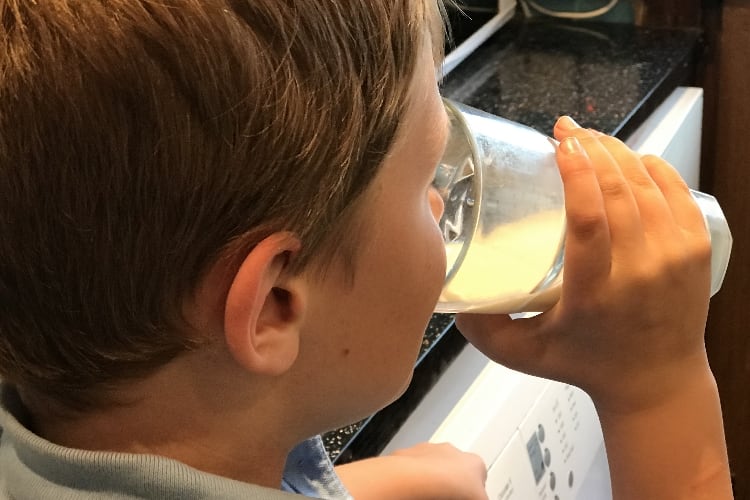Lead author Therese O’Sullivan, an associate professor at Edith Cowan University’s School of Medical and Health Sciences, said the findings highlighted the need for better evidence in the area of childhood dairy nutrition.
“Dietary guidelines in Australia and other countries recommend children primarily consume reduced-fat dairy products to maintain a healthy weight and good cardiovascular health,” she said.
“We found studies were consistent in reporting that whole-fat dairy products were not associated with increased levels of weight gain or obesity.”
Reduced-fat dairy is generally recommended for both adults and children over the age of two years due to its lower energy and saturated fat content.
If a child is growing well, guidelines suggest parents switch to low-fat dairy products starting at two to protect children from the risk of obesity and cardiovascular disease.
However, O’Sullivan’s team found studies suggesting that children who consumed low-fat over full-fat dairy were actually replacing those calories from fat with other foods.
“This suggests that low-fat dairy is not as filling as whole-fat dairy, which may lead kids to consume more of other foods. Health effects may depend on what these replacement foods are.”
With childhood obesity a serious issue in Australia—the government estimates that 28% of children and adolescents are either overweight or obese—the need for evidence-based guidelines for parents has never been greater, according to O’Sullivan.
“Parents are already overwhelmed by conflicting advice for kids’ nutrition, especially when it comes to full-fat versus low-fat dairy,” she said.
“We need more good quality research to inform evidence-based guidelines for parents, even if that means rethinking what we thought we knew about dairy.”
O’Sullivan also said whole-fat dairy may play an important role in a balanced diet for growing children.
“Dairy is a good dietary source of nutrients for healthy development, including protein, calcium, potassium, phosphorus and several vitamins,” she said.
“Even though the fats found in whole-fat dairy are mostly saturated fats, they don’t appear to be associated with the same detrimental health effects observed with foods like fatty meats.”
Published in Advances in Nutrition, the Edith Cowan research reviewed 29 studies from around the world that examined consumption of full-fat dairy products in children.
The researchers found there was no clear link between the consumption of whole-fat dairy products and weight gain, high cholesterol or high blood pressure in children. However, most studies were observational, with a lack of reliable trials noted.
O’Sullivan is also leading Edith Cowan’s Milky Way Study in collaboration with the University of Western Australia and the Telethon Kids Institute.
This randomized controlled trial is the first of its kind anywhere to investigate the effects of dairy fat intake in children. The results are expected midway through this year.
“For most kids milk is a very important part of their diet, but we don’t really have enough evidence suggesting whether we should be giving them low-fat or full-fat dairy products,” she said when the study began in 2017.
“Traditionally, we think of dairy fat as bad fat because it’s mostly saturated fat, but as we see more evidence come out we are realizing that not all saturated fat is the same and there may be something about dairy fat that makes it different to other fats and potentially has some health benefits.”
The trial has taken 54 Australian kids between 4-6 years old, who were given popular dairy brands for three months, though parents were not told if these were low- or full-fat.
The Milky Way Study team also believe that full-fat dairy could help gut bacteria and heart health for better cholesterol and blood pressure.
Moreover, they suspect drinking whole milk could even help children increase strength by boosting the brain’s connection with muscles to make them work better.
The recently published Edith Cowan review sides with another review from Canada in January that found children who drank whole milk had a 40% lower risk of being overweight or obese.
None of the 28 studies from seven countries that it looked at—which involved a total almost 21,000 children between the ages of one and 18— showed kids who drank reduced-fat milk had a lower risk of being overweight or obese.
Last August, the Australian Heart Foundation’s own review led to new dietary recommendations regarding dairy for adults, which gave full-fat a clean bill of health.
At the time, Heart Foundation chief medical adviser Garry Jennings, advised: “We have removed our restriction for healthy Australians on eating full-fat milk, cheese and yogurt. While the evidence was mixed, this type of dairy was found to have a neutral effect, in that it doesn’t increase or decrease your risks for heart disease or stroke.
“Given this, we believe there is not enough evidence to support a restriction on full-fat milk, yogurt and cheese for a healthy person, as they also provide healthy nutrients like calcium.”
According to Nutrition Australia, most Australians don’t include enough dairy in their diet. Most children also need to increase their intake of the dairy food group in order to meet recommendations.

